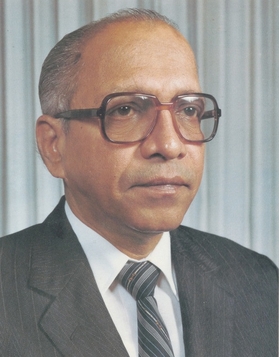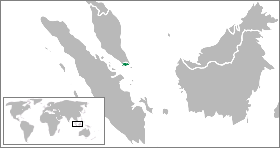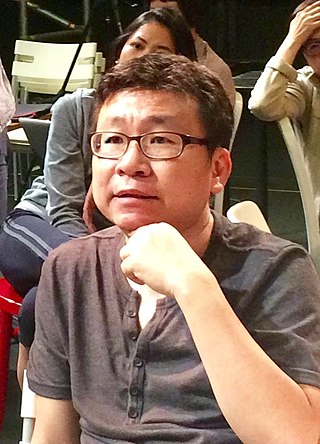Related Research Articles

Chengara Veetil Devan Nair, also known as C. V. Devan Nair, better known as Devan Nair, was a Singaporean politician and union leader who served as the third president of Singapore from 1981 until his resignation in 1985.

There is a long history of lesbian, gay, bisexual, and transgender activity in Singapore. Male homosexuality was outlawed under British rule, despite being acknowledged among the local population. Following Japanese occupation during World War II and the country gaining independence, homosexuality and transvestism were visible as a street scene, and from the 1970s were catered for in some nightclubs. In that decade also, Singapore became a centre of gender-reassignment surgery.

A Nominated Member of Parliament (NMP) is a member of the Parliament of Singapore who is appointed by the president. They are not affiliated to any political party and do not represent any constituency. There are currently nine NMPs in the Parliament.

A Non-constituency Member of Parliament (NCMP) is a member of an opposition political party in Singapore who, according to the Constitution and Parliamentary Elections Act, is declared to have been elected a Member of Parliament (MP) without constituency representation, despite having lost in a general election, by virtue of having been one of the best-performing losers. When less than 12 opposition MPs have been elected, the number of NCMPs is the difference to total 12. NCMPs enjoy all of the privileges of ordinary members of Parliament, apart from the salary, which is substantially lower.
Section 377A was a Singaporean law that criminalised sex between consenting adult males. It was introduced under British colonial rule in 1938 when it was added to the Penal Code by the colonial government. It remained a part of the Singapore body of law after the Penal Code review of 2007 which removed most of the other provisions in Section 377. It was subsequently repealed in its entirety in 2023.

The rights of lesbian, gay, bisexual, transgender, and queer (LGBTQ) people in Singapore have evolved over the decades. Same-sex sexual activity is legal for both males and females; for men it was officially legalised in 2022 after being de facto decriminalised since 2007, and for women it was always legal. Prior to 2022, same-sex sexual activity between males was de jure illegal under the British colonial-era Section 377A of the Penal Code. The law had been de facto unenforced for decades. In February 2022, the Court of Appeal in the Supreme Court reaffirmed that 377A cannot be used to prosecute men for having sex with other men, and that it is "unenforceable in its entirety". Transgender rights in the country are also progressive in the region, which included Singapore being the first country in Asia to legalise sex reassignment surgery in 1973.

Calvin Cheng Ern Lee is a Singaporean businessman and former Nominated Member of Parliament. Cheng is known for his views on socio-political issues in Singapore. He began his business career in the modeling industry and expanded into event hosting, publishing, and educational technology.

The Presidential Elections Committee (PEC) is a six-member council set up by the Government of Singapore to ensure that each candidate running for the office of President of Singapore fulfils the stringent qualifications set out in Article 19 of the Constitution of Singapore.
The Constitution of the Republic of Singapore is the supreme law of Singapore. A written constitution, the text which took effect on 9 August 1965 is derived from the Constitution of the State of Singapore 1963, provisions of the Federal Constitution of Malaysia made applicable to Singapore by the Republic of Singapore Independence Act 1965, and the Republic of Singapore Independence Act itself. The text of the Constitution is one of the legally binding sources of constitutional law in Singapore, the others being judicial interpretations of the Constitution, and certain other statutes. Non-binding sources are influences on constitutional law such as soft law, constitutional conventions, and public international law.

Chan Heng Chee is a Singaporean academic and diplomat who has been serving as Ambassador-at-Large at the Ministry of Foreign Affairs since 2012, Chairwoman of the National Arts Council and Member of the Presidential Council for Minority Rights. She had also served as Singapore Ambassador to the United States between 1996 and 2012.

An OB marker, short for "out of bounds marker", is used in Singapore to denote what topics are permissible for public discussion. Discussion topics that go beyond the OB marker, are considered to be either societal, cultural or political taboos. The entire phrase "out of bounds marker", however, is rarely used within the political landscape.

Thio Li-ann is a Singaporean law professor at the National University of Singapore. She was educated at the University of Oxford, Harvard Law School and the University of Cambridge. In January 2007, she was appointed a Nominated Member of Parliament (NMP) in Singapore's 11th Parliament.
Viswaroopan ("Viswa") Sadasivan was a Nominated Member of Parliament (NMP) in the Parliament of Singapore from 2009 to 2011.

Singapore has a multi-party parliamentary system of representative democracy in which the President of Singapore is the head of state and the Prime Minister of Singapore is the head of government. Executive power is vested in the President and the Cabinet. Cabinet has the general direction and control of the government and is collectively responsible to the Parliament. There are three separate branches of government: the legislature, executive and judiciary.

The Separation of powers in Singapore is governed by Constitution of the Republic of Singapore, which splits the power to govern the country between three branches of government – the parliament, which makes laws; the executive, which executes them; and the judiciary, which enforces them. Each branch, while wielding legitimate power and being protected from external influences, is subject to a system of checks and balances by the other branches to prevent abuse of power. This Westminster constitutional model was inherited from the British during Singapore's colonial years.

By-elections in Singapore are elections held to fill seats in the Parliament of Singapore that fall vacant in between general elections, known as casual vacancies. In the past, the Government of Singapore took the position that the Prime Minister had discretion whether or not a by-election should be called to fill a casual vacancy in a Single Member Constituency, and could leave a parliamentary seat unfilled until the next general election. However, in the case of Vellama d/o Marie Muthu v. Attorney-General (2013), which arose from a vacancy in Hougang Single Member Constituency, the Court of Appeal held that the Constitution of Singapore obliges the Prime Minister to call a by-election unless a general election is going to be held in the near future. However, a by-election need only be called within a reasonable time, and the Prime Minister has the discretion to determine when it should be held.

Kok Heng Leun is a former Singapore Nominated Member of Parliament (NMP) who represented the arts sector in Singapore. He was appointed by the President of Singapore in March 2016. He steps down as Co-Artistic Director of Singaporean theatre company Drama Box in 2022, and continue his practice in the company as an Artist, Founder. He is a member of the Singapore Chinese Cultural Centre Programme Committee, and is part of the arts advisory panel of the National Arts Council, Singapore.

Navtej Singh Johar &Ors. v. Union of India thr. Secretary Ministry of Law and Justice (2018) is a landmark decision of the Supreme Court of India that decriminalised all consensual sex among adults, including homosexual sex.
Geraldine Heng is Mildred Hajek Vacek and John Roman Vacek Chair in English and Comparative Literature at the University of Texas at Austin, where, as of November 2022, she was also affiliated with Middle Eastern studies, Women’s studies, Jewish Studies, and the Rapoport Center for Human Rights and Social Justice. Heng's work focuses on literary, social and cultural encounters between societies in the period 500–1500 CE. She is noted as a key figure in the development of postcolonial approaches to the European Middle Ages, premodern critical race studies, and critical early global studies.
Avadai Dhanam Lakshimi was a Singaporean former politician who served as the Member of Parliament (MP) representing Moulmein SMC from 1963 to 1968 and the 3rd First Lady of Singapore as the Spouse of the president of Singapore, Devan Nair, President from 1981 to 1985.
References
- ↑ Institute of Policy Studies. "Janadas Devan". Archived from the original on 17 July 2012. Retrieved 9 January 2013.
{{cite web}}:|last=has generic name (help) - ↑ "Appointment to the Government Information Service". Ministry of Communications and Information. Archived from the original on 8 September 2017. Retrieved 8 September 2017.
- ↑ Janadas Devan (7 January 2006). Speech by Mr. Janadas Devan at the Memorial Service for the late C.V. Devan Nair (Speech). Singapore Conference Hall. Archived from the original on 20 September 2006. Retrieved 12 May 2008.
- ↑ Geraldine Heng, The Invention of Race in the European Middle Ages (New York, NY: Cambridge University Press, 2018), p. xiii.
- ↑ K. Kanagalatha, 'Mother was our World', The Straits Times (13 May 2018).
- ↑ "Call from America". Archived from the original on 8 March 2008.
- ↑ Janadas Devan (6 June 1996). "'The Singapore Way'". The New York Review of Books.
{{cite magazine}}: Cite magazine requires|magazine=(help) - ↑ Janadas Devan (27 October 2007). "377A debate and the rewriting of pluralism". The Straits Times .
- 1 2 The Straits Times Interactive
- ↑ ST Forum
- ↑ 'The Singapore Way' – The New York Review of Books
- ↑ Janadas Devan (7 July 2007). "Can mum, mum and kids make a family?". The Straits Times.
- ↑ imp-332 Can mum, mum and kids make a family?
- ↑ imp-334 Letters to the press re 'Can mum. mum and kids'